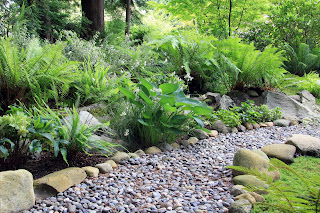This stunning flagstone is available in Patio 1"- 1.5" & 1.5"- 2", and 3/4"" Minus Stand Up
Thursday, April 28, 2022
Monday, April 25, 2022
How to Make an Outdoor Swing | HGTV
Friday, April 22, 2022
History of Gardening
Forest gardening, a forest-based food production system, is the world's oldest form of gardening. Forest gardens originated in prehistoric times along jungle-clad river banks and in the wet foothills of monsoon regions. In the gradual process of families improving their immediate environment, useful tree and vine species were identified, protected and improved while undesirable species were eliminated. Eventually foreign species were also selected and incorporated into the gardens.
After the emergence of the first civilizations, wealthy individuals began to create gardens for aesthetic purposes. Ancient Egyptian tomb paintings from the New Kingdom (around 1500 BC) provide some of the earliest physical evidence of ornamental horticulture and landscape design; they depict lotus ponds surrounded by symmetrical rows of acacias and palms. A notable example of ancient ornamental gardens were the Hanging Gardens of Babylon—one of the Seven Wonders of the Ancient World —while ancient Rome had dozens of gardens.
Wealthy ancient Egyptians used gardens for providing shade. Egyptians associated trees and gardens with gods, believing that their deities were pleased by gardens. Gardens in ancient Egypt were often surrounded by walls with trees planted in rows. Among the most popular species planted were date palms, sycamores, fig trees, nut trees, and willows. These gardens were a sign of higher socioeconomic status. In addition, wealthy ancient Egyptians grew vineyards, as wine was a sign of the higher social classes. Roses, poppies, daisies and irises could all also be found in the gardens of the Egyptians.
Assyria was also renowned for its beautiful gardens. These tended to be wide and large, some of them used for hunting game—rather like a game reserve today—and others as leisure gardens. Cypresses and palms were some of the most frequently planted types of trees.
Gardens were also available in Kush. In Musawwarat es-Sufra, the Great Enclosure dated to the 3rd century BC included splendid gardens.
Ancient Roman gardens were laid out with hedges and vines and contained a wide variety of flowers—acanthus, cornflowers, crocus, cyclamen, hyacinth, iris, ivy, lavender, lilies, myrtle, narcissus, poppy, rosemary and violets—as well as statues and sculptures. Flower beds were popular in the courtyards of rich Romans.
Read more, here.
Tuesday, April 19, 2022
Saturday, April 16, 2022
Wednesday, April 13, 2022
Gardening
Gardening is the practice of growing and cultivating plants as part of horticulture. In gardens, ornamental plants are often grown for their flowers, foliage, or overall appearance; useful plants, such as root vegetables, leaf vegetables, fruits, and herbs, are grown for consumption, for use as dyes, or for medicinal or cosmetic use.
Gardening ranges in scale from fruit orchards, to long boulevard plantings with one or more different types of shrubs, trees, and herbaceous plants, to residential back gardens including lawns and foundation plantings, and to container gardens grown inside or outside. Gardening may be very specialized, with only one type of plant grown, or involve a variety of plants in mixed plantings. It involves an active participation in the growing of plants, and tends to be labor-intensive, which differentiates it from farming or forestry.
Read more, here.
Sunday, April 10, 2022
Flagstone : Arizona Patio
Tumbled 1" - 2" The beautiful desert flagstone comes will enhance any home patio or garden.
Thursday, April 7, 2022
Low Maintenance Landscaping Ideas
Monday, April 4, 2022
Landscaping
Landscaping refers to any activity that modifies the visible features of an area of land, including the following:
- Living elements, such as flora or fauna; or what is commonly called gardening, the art and craft of growing plants with a goal of creating a beauty within the landscape.
- Natural abiotic elements, such as landforms, terrain shape and elevation, or bodies of water.
- Abstract elements, such as the weather and lighting conditions.
- Landscaping requires expertise in horticulture and artistic design.








